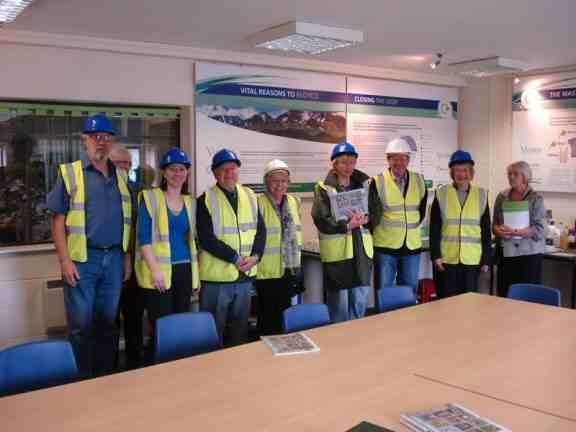It was a bright sunny morning, with a cool breeze, when we met at the Materials Recycling Facility operated by leading recycling company Viridor at Fourth Drove, Peterborough.
We assembled in the Education Room, where a choice of hot drinks awaited us and were greeted by Sarah Reay, Education Officer, who was our able hostess and guide for the tour. Sarah welcomed us and gave us a screen presentation with some facts and figures and a health and safety briefing before we donned yellow high visibility jackets, hard hats, protective goggles and volume adjustable ear microphones. Sarah explained that it was very noisy in the working areas and she needed to keep in touch, in order to provide a commentary on the various processes, advise us when staff needed a clear passage and also when to turn our cameras off in order to avoid damage to our batteries from the powerful magnets used on site.
We had already seen the mountain of assorted materials through the viewing window, but had not experienced the noise. It very quickly became obvious why we needed the ear microphones, as we entered the first working area, where a dumper truck delivered piles of mixed materials to a trough in the ground floor where it began its ascent on a conveyor belt to the first floor. We had to climb the stairs and arrived at a room where most of the cardboard was being separated out by a team of workers. The conveyor belt moved at a dizzy speed and the team was doing a splendid job.
Even though Peterborough City Council issues clear instructions to households about which materials should and should not be placed in the green wheelie bins, these are not always adhered to and unsuitable materials inevitably arrive at the site. Such items are classed as contaminants and can include toys, pushchairs and the odd old t-shirt. The facility is fully equipped to sort and separate, both using high-tech equipment and by a team of employees. All employees can halt the conveyor belt, should it prove necessary. This type of facility does not accept food waste but the council is investigating to introduce a separate food waste processing plant.
Our intrepid group progressed to see further conveyor belts, an enormous revolving drum designed to separate plastic bags for disposal and a section where powerful magnets extract steel cans for recycling. The remaining aluminium cans are then dealt with separately. Most glass bottles and jars are dealt with initially by the powerful crushing equipment in the collection vehicles. Holes in the conveyors and in the revolving drum allow the broken pieces to pass through, so that these can be collected for recycling. The separated materials are sold in the UK and abroad.
Finally, we arrived back at the Education Room, where we disrobed, were invited to use hand-sanitizer and were offered further hot drinks. Sarah then answered all our questions, not only about the processes we had seen, but also about suitable and unsuitable items for our green wheelie bins and the reasons. She also gave us some helpful advice about where to take items for recycling which cannot be dealt with via the bins. We then had the opportunity to see some of the goods and materials which can be manufactured from the end products.
We can thoroughly recommend this interesting and enjoyable visit, for which there is no charge. Please remember it is a working plant and for your own wellbeing, health and safety regulations apply. If you are interested please contact Sarah on (01733) 555837 or email .



